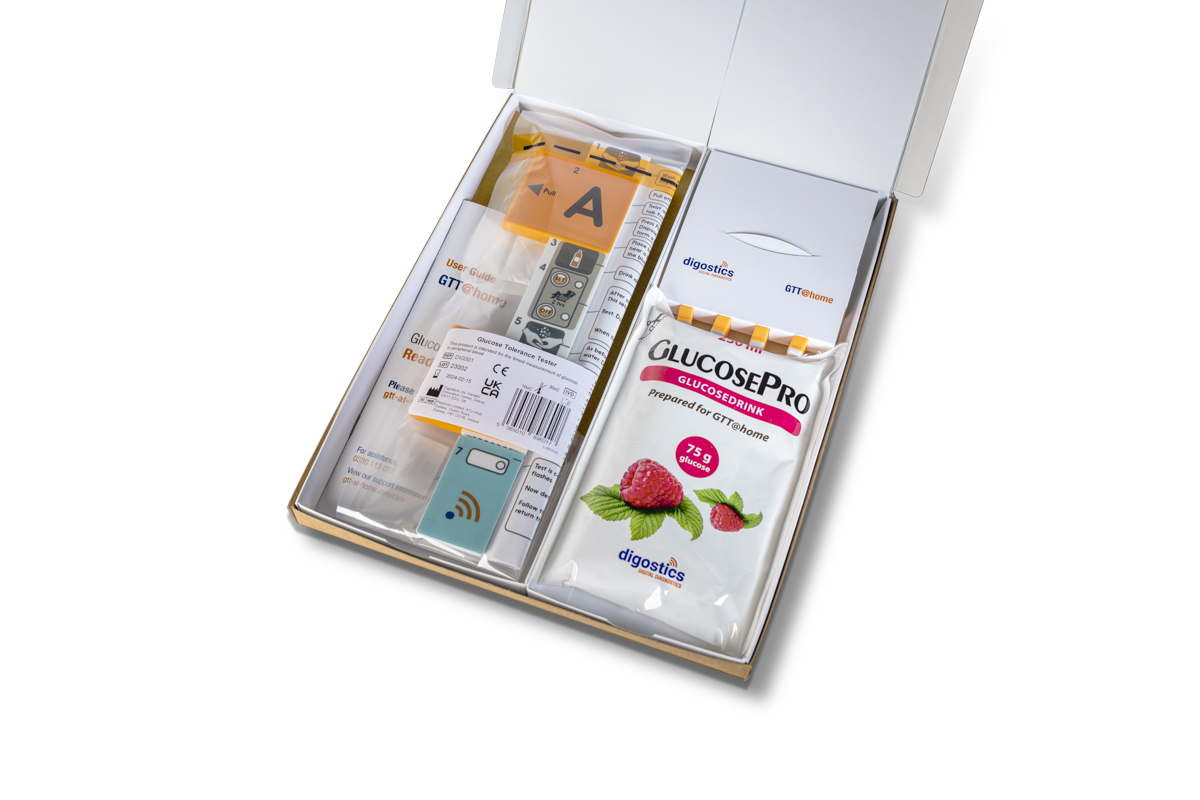World-First Introduction of Home Oral Glucose Tolerance Testing Service for Gestational Diabetes Sees University Hospital Southampton Improve Test Accessibility and Yield Maximum User Preference Scores

OXFORD, UK / ACCESSWIRE / February 21, 2024 / Digital clinical diagnostics and diabetes home testing provider Digostics revealed today the results from its ground-breaking gestational diabetes mellitus (GDM) remote screening collaboration with University Hospital Southampton NHS Foundation Trust (UHS), a partnership that saw expectant mothers in Hampshire become the first globally to access the gold standard oral glucose tolerance test (OGTT) without needing to attend clinic.
The initiative, first announced in April 20231, saw women assessed as at risk of developing GDM by their midwife issued with a GTT@home test kit from Digostics to undertake their OGTT at home. The service’s introduction saw all women successfully tested in their target test week. Furthermore, 100% of mothers and maternity staff who responded to user surveys recommended GTT@home over traditional clinic-based testing.
The implementation of GTT@home stemmed from an ambition by UHS to improve the quality of the test and to test in a more patient-focused way. Additionally, to enable testing to be undertaken more quickly so that treatment can be initiated sooner where required. Objectives also included reducing the number of antenatal appointments required, freeing up valuable resources and improving healthcare equity of access, particularly for at-risk patient groups.
Improvements in test uptake, quality and reliability, earlier diagnoses and user satisfaction levels, when combined with a significant reduction in OGTT management workload for maternity services, have seen the implementation meet or exceed all agreed success criteria.
“We are constantly trying to balance the critical importance of OGTT provision with the significant human resource and administrative demands in-clinic OGTTs place on us as a busy team.” said Rachel Hanley, Community Service Matron, UHS “GTT@home has demonstrated that there is finally another way, one that not only helps ensure prompt and timely access to GDM testing, but that frees up countless valuable midwifery staffing hours to be redirected to other essential antenatal and postnatal activity.”

Up to 20%2 of UK pregnancies are impacted by GDM, with background risk factors including age, ethnicity and body mass index.3 Undiagnosed or untreated, GDM can lead to pregnancy complications that warrant unscheduled or even emergency changes to the birth-plan to protect both mother and baby. GDM also confers an increased risk for both mother4 and child5 of developing Type 2 diabetes later in life and accurate diagnosis with a reliable test is therefore important.
Prior to the implementation of GTT@home, undertaking an OGTT would require women to travel, while fasted, to a dedicated clinic on a specific date and spend over two hours at the hospital. The inconvenience the in-clinic test represents, especially for example for those with childcare pressures, means missed appointments and late tests are frequent. 97% of those using GTT@home found the ability to home test advantageous, with the same percentage welcoming the flexibility to choose which day they tested. 90% found the GTT@home test device easy to use, with no one finding it difficult to use.
“The contribution GTT@home has made to improving OGTT test patient empowerment, equity and accuracy will enable improved care for our patients when GDM is suspected and detected,” said Dr Matthew Coleman, Consultant Obstetric Physician at UHS. “In equal parts we are excited that this revolutionary new at-home test is going to dramatically change the way we deliver GDM testing during antenatal care.”

In a significant improvement from the in-clinic workflow, which typically sees blood samples only sent to the laboratory for analysis once the final test of the day has been completed, GTT@home ensures both blood tests associated with the OGTT – the initial fasting test and the two-hour test after consumption of a glucose drink – are analysed immediately at the point of testing. This eliminates the sample degradation that can occur between in-clinic blood sampling and laboratory analysis with the traditional OGTT.

After completing a test with GTT@home, the user can send their test data directly to their antenatal care team with a simple scan of a snap-off fob attached to the innovative test device using the GTT@home mobile app and the near field communication (NFC) functionality within their smartphone. Although users can send their test data via a prepaid envelope in the test kit, 98% elected to send their data via their smartphone, with their results available for review by their midwife much faster than could be achieved via the hospital laboratory.
“UHS’ pilot implementation of GTT@home has shown that OGTT home testing is not just a viable alternative to in-clinic testing but a significantly more accessible way to screen women for diabetes and potentially improve test accuracy,” said Professor Richard Holt, Professor in Diabetes and Endocrinology, University of Southampton.

After the successful pilot of GTT@home at UHS, NHS trusts and health boards nationwide are looking to introduce GTT@home for their pregnant women in 2024. UK-based Digostics is also setting up operations in the Middle East and Asia Pacific to meet the significant demand for GTT@home in these regions and aims to expand to Europe and the USA.
“The results achieved by UHS in having the vision to eliminate barriers to effective GDM screening by taking diabetes testing directly to the mum-to-be speak for themselves,” said James Jackson, CEO and Founder of Digostics. “We congratulate our partners at UHS on the success of their GTT@home implementation and for breaking exciting new ground in both global diabetes innovation and women’s health.”

***
Images of Matthew Coleman and of University Hospital Southampton’s premises are kindly provided by University Hospital Southampton NHS Foundation Trust. Images of Richard Holt are kindly provided by the University of Southampton.
About Digostics
Far too many people across the world are living with undiagnosed diabetes.
UK-based Digostics’ mission is to enable healthcare providers to identify everyone with diabetes, and those at risk of developing diabetes, by eliminating the common barriers that inhibit accurate and timely testing using the gold standard oral glucose tolerance test (OGTT).
Digostics is proud to offer GTT@home – the world’s first home OGTT offering and the most accessible and scalable way for clinical teams to realise their diabetes testing objectives.
For more information visit www.digostics.com
About University Hospital Southampton NHS Foundation Trust
University Hospital Southampton NHS Foundation Trust (UHS) is one of the largest acute teaching trusts in England with a turnover of more than £1.15 billion in 2021/22. UHS provides hospital services for 1.9 million people living in southern Hampshire and specialist services – including neurosciences, respiratory medicine, cancer, cardiovascular, obstetrics and specialist children’s services – to more than 3.7 million people in central southern England and the Channel Islands. Southampton General Hospital is a designated major trauma centre serving the Wessex Region and Channel Islands and is one of only two places in the south of England to offer adults and children full onsite major trauma care provision.
Every year more than 13,000 staff see 650,000 people at outpatient appointments, deal with 150,000 attendances at the emergency department and treat 160,000 admitted emergency, inpatient or day case patients. In addition, the trust delivers more than 100 outpatient clinics across the south of England to keep services local for patients. Providing these services costs £2.7 million per day.
Following the Care Quality Commission’s most recent inspection (report published in April 2019), all sites and services across UHS are now rated as ‘good’ or ‘outstanding’ in the effective and caring domains. Overall, the trust received a ‘good’ rating – and ‘outstanding’ for providing effective services. Among individual services, the CQC rated urgent and emergency services, medical care, surgery, services for children and young people and end of life care ‘good‘, with critical care ‘outstanding’. To view the full report, visit www.cqc.org.uk/provider/RHM/reports.
UHS is consistently one of the UK’s highest recruiting trusts of patients to clinical trials and in the top ten nationally for research study volume as ranked by the NIHR Clinical Research Network. In partnership with the University of Southampton, UHS has £27 million of NIHR infrastructure dedicated to bringing the latest treatments to patients. For more information, visit www.uhs.nhs.uk/ClinicalResearchinSouthampton.
To help shape the future of hospital services and raise issues that are important to patients, families and visitors, become a UHS member. Anyone interested in finding out more or joining can contact the membership office on www.uhs.nhs.uk/members.
Follow us on Twitter, Facebook, Instagram and LinkedIn for all the latest news updates.
Southampton Hospitals Charity enhances the care and treatment of our patients by raising funds to support areas that lie beyond the scope of NHS funding. For more information, visit www.southamptonhospitalscharity.org
About the University of Southampton
The University of Southampton drives original thinking, turns knowledge into action and impact, and creates solutions to the world’s challenges.
We are among the top 100 institutions globally (QS World University Rankings 2023). Our academics are leaders in their fields, forging links with high-profile international businesses and organisations, and inspiring a 22,000-strong community of exceptional students, from over 135 countries worldwide.
Through our high-quality education, the University helps students on a journey of discovery to realise their potential and join our global network of over 200,000 alumni. www.southampton.ac.uk
1 NHS Hospital Trust Pilot of New Testing Technology Sees Pregnant Women in Southampton Become the First Patients Globally to Access Gestational Diabetes Testing at Home.
2 International Diabetes Federation – Diabetes Atlas 10th Edition 2021
3 NHS Gestational Diabetes Overview
4 International Diabetes Federation – Care and Prevention – Gestational Diabetes
5 Pubmed – Future of diabetes in mother and child after gestational diabetes mellitus 2009
Media Contact(s)
Graeme Collins, Digostics
Mobile: +44 (0)7854 664168
Email: gc@digostics.com
University Hospital Southampton NHS Foundation Trust
Email: communications@uhs.nhs.uk
SOURCE: Digostics Limited
View the original press release on accesswire.com
